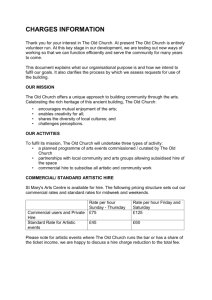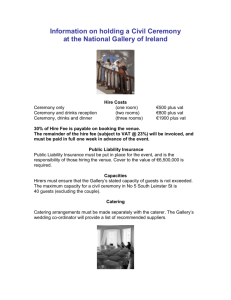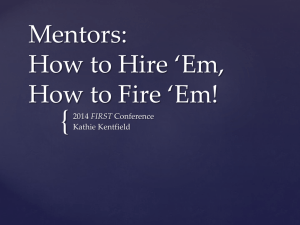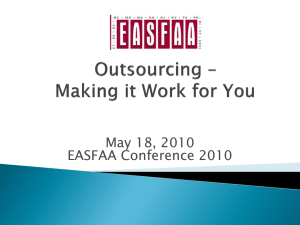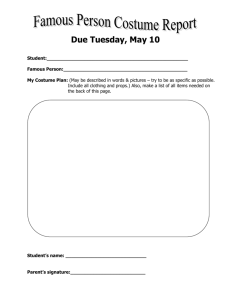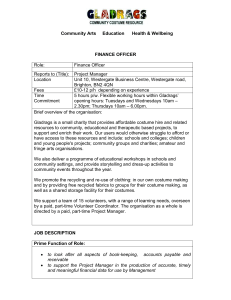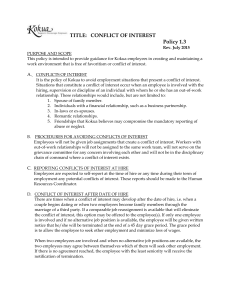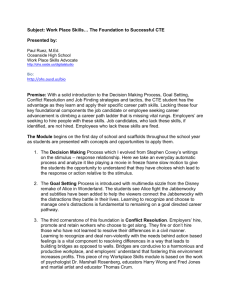Budgetting - The Tower Theatre Company
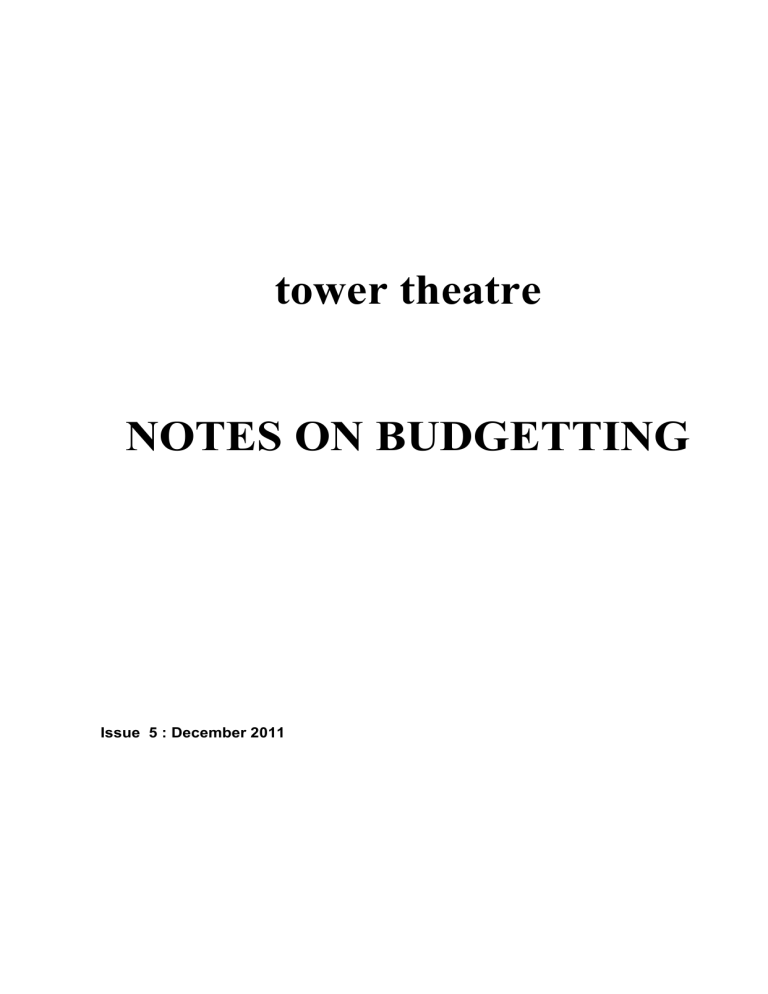
tower theatre
NOTES ON BUDGETTING
Issue 5 : December 2011
NOTES ON BUDGETTING
Who Are These Notes For?
These notes are intended to help anyone responsible for expenditure on a production.
How Do We Set A Budget?
As we all know, the Tower is always short of funds. On the other hand we all want to put on our productions in the best possible way, and this will always involve spending money.
The production budget is the system we use to decide how much money to spend on a particular show. It is a common mistake to assume that there is a fixed, pre-determined amount available for each show. There is not. If there were, it would encourage people to spend this amount whatever the real requirements were. This would lead to too much money being spent on some shows, and too little on others. Instead, we expect each production to decide what it wants to do and prepare proposals accordingly . The production team (director, designer, stage manager etc) can then set their own priorities and in their joint artistic and commercial judgement use money to maximum effect on their show. The aim is to help everyone involved to put on the show in the way they want and to help everyone involved to put on the show in the way they want and to encourage creative ideas. Obviously, there is a limit to what the Tower can afford, and at times the
Artistic and Financial Directors will have to say no. But in general, production teams are very cost-conscious. At the budget production meeting your proposals will be brought up before one of the Artistic Direction Team (the Artistic Director or one of the assistant
ADs) attending your meeting and your budget will be determined.
How to organise your budget
Every production should have a formal budget meeting . This should be held before any money needs to be spent, but after initial design ideas have been agree d. About
6 weeks before the show's opening is probably about right. The director or stage manager should call the meeting, inviting set, costume, lighting and sound designers, the show's publicity co-ordinator and the musical director if there is one. Representatives of the Technical Group will come if invited; their main role is to provide advice on the cost of materials and various aspects of safety. One of the Artistic Direction team must also be invited. The meeting is an important part of the process of putting a show on; don't try to skimp the time by trying to fit it in an odd halfhour before a rehearsal. Allow at least 1½ hours.
At the meeting a Budget Form should be filled in and signed off by the Artistic Direction
Team member present (sample of form is at the end of these notes).
Account Suppliers
No account supplier should be asked to supply goods without an order number reference.
Order forms are in the office and bear the appropriate number on them. A show reference should also be quoted.
2 Budgetting Issue 5 : December 2011
What to put in the budget
1. The basic list – A budget form should be included in your stage managers pack. If not, please request from your Technical Co-ordinator.
Most shows will need to consider the following:
Set materials
Furniture hire
Properties (don't forget food and drink)
Costume materials
Costume hire
Lighting consumables (gel, gaffer tape etc)
Sound hire
Special Publicity and Photographs
Transport costs to and from the venue and Ironmonger Row
For hired items, don't forget the cost of delivery and collection if you are unable to do this yourselves. Don't include VAT in any of your figures.
2. What you may need to consider on some shows
These items will not be a cost on every show, but if needed they must be included in the production budget
Hire of scripts, scores or band parts
Musicians expenses
Hire of outside rehearsal space
Special effects (pyrotechnics etc)
3. What at you need not worry about
The following items are decided at the start of the season and so needn't be considered at the Production Budget meeting :
Play royalties
Venue Hire costs
Programmes
The following items are charged to the overall theatre funds, and they are therefore not part of the show budget
Performing Rights Fees
Electricity, gas, water
Replacement light bulbs for our standard stock equipment
Recording tape
Rubbish removal costs
Basic publicity
Insurance
VAT
3 Budgetting Issue 5 : December 2011
4. How much money is too much?
As noted above, there is no pre-determined figure for the total budget and every effort should be made to make it as small as reasonably possible.
Popular misconceptions
A. Buying for stock on a maintenance budget
Every so often someone has the idea that we should 'invest" in materials for stock that can be charged to an overhead maintenance budget, so that the show does not bear the cost. This is not permitted because a) There is no actual saving - the Theatre has to pay the bill whatever the budget it is allocated. b) We have no storage space for stocks. c) Past experience suggests that the one show's idea of a good investment may not be another's - for example, one colour lighting gel may not ever be used by another designer, and therefore buying for stock is a complete waste.
If you need something for your show, say so and ask for the money; don't try to hide it.
However, if you can share the cost with another show because they want the same as you, then by all means go ahead and split the bill.
B. The Stage Manager's float is the props budget
Sometimes Stage Managers are given a float to cover incidental cash expenses. Mostly these tend to be for props but the money is for all expenses . The float is just part of the total budget; the props budget may be less than or greater than the value of the float depending on the show.
Accounting for your expenses
Whether you have a float or not, it is essential that you keep all the receipts and a set of accounts. Each Stage Manager is obliged to personally account for the money spent, paying back the Company where appropriate, or requesting extra money if the float has been exceeded.
A float will not be issued until the overall production budget is agreed.
The accounts, whether written or typed, should be set out as shown overleaf.
4 Budgetting Issue 5 : December 2011
ACCOUNTS FOR (XXXXXXX)
(date) to (date)
Receipt No. Date Item Amount VAT (Y/N)
1.
2
Opening Balance xxxxx etc.
Closing Balance
£abc.00
-
£ xx.xx
£ xyz.xx
Points to remember are : - i. All receipts should be numbered on the accounts with corresponding numbers on the receipts themselves. ii. Items on which VAT is charged and where the VAT number is shown on the receipt should be identified on the accounts so that the VAT may be claimed back.
(This excludes food and other VAT exempt items.)
The following items cannot be claimed for : i. Scripts ii. Haircuts iii. Personal travel expenses (except for petrol for van hire) iv. Teas (food, coffee etc other than where required as a prop) - the cast and crew must pay for these themselves. v. Clothing - unless Wardrobe has specifically authorised a member of the cast to purchase an item of clothing, etc, the costs are not recoverable. Cast members are expected to supply their own tights, knickers, hairpieces, hairnets, modern accessories, etc. vi. If in doubt as to whether an item is recoverable, check first with a member of the
Artistic Team.
Notes prepared by Laurence Tuerk
November 1991
Fourth Revision, December 2011
5 Budgetting Issue 5 : December 2011
PRODUCTION COST ESTIMATE FORM
PRODUCTION:
PRODUCTION MEETING DATE
DIRECTOR
STAGE MANAGER
ARTISTIC TEAM REP
Set Construction:
Materials
Paint
Furniture Hire
Material Hire
Transport Hire
Lighting/Video:
Consumables
Hire
Sound:
Consumables
Hire
Estimated Max Cost
Wardrobe:
Materials
Hire
Music:
Fees
Hire
Cleaning fee 30.00
Stage Management:
Props Purchase
Props Hire
Sundries
OFFICE:
Hire of rehearsal space
FOR COMPLETION BY
Venue rent
Royalties
Additional Publicity
Total
APPROVED BY
DATE
EXPENSES COMPLETED AND
CONFIRMED BY OFFICE ON:
6
Actual Cost
Budgetting Issue 5 : December 2011
NOTES ON COMPLETION
ALL REQUESTS FOR REIMBURSEMENT OF EXPENSES MUST BE RECEIVED IN
THE OFFICE WITHIN TWO WEEKS OF THE END OF THE RUN.
FAILURE TO SUBMIT THE ESTIMATED PRODUCTION COSTS IN ADVANCE WILL
RESULT IN DELAYS IN PAYMENT OF EXPENSES.
ALL COSTS MUST INCLUDE VAT AND A VAT ESTIMATE MUST BE PROVIDED FOR
EACH EXPENDITURE.
EACH SHOW MUST HAVE A PRODUCTION MEETING WHERE ALL COSTS ARE
CONSIDERED AND ESTIMATED.
THE ATTACHED FORM IS COMPLETED BY DIRECTOR/STAGE MANAGER EITHER
AT OR BEFORE THE PRODUCTION MEETING LIAISING WITH THE AT REP.
A COPY OF THE COMPLETED FORM SHOULD BE SENT TO THE OFFICE
FOLLOWING THE PRODUCTION MEETING AND TO THE COMPANY COMMITTEE
VIA THE ARTISTIC TEAM REP.
ANY “ EXTRAORDINARY ” ITEMS THAT MAY BE HARD TO SOURCE OR
EXPENSIVE SHOULD BE IDENTIFIED EARLY ON AND APPROVED
A BUDGET OF £ 450 IS ALLOCATED, IN THEORY, FOR EACH SHOW, HOWEVER,
ANY SAVING ON EXPENDITURE WOULD BE APPRECIATED
ANY EXPENDITURE PUTTING THE SHOW BUDGET ABOVE THIS AMOUNT MUST
BE APPROVED IN ADVANCE
UNAPPROVED EXPENSES WILL NOT BE REIMBURSED.
7 Budgetting Issue 5 : December 2011

